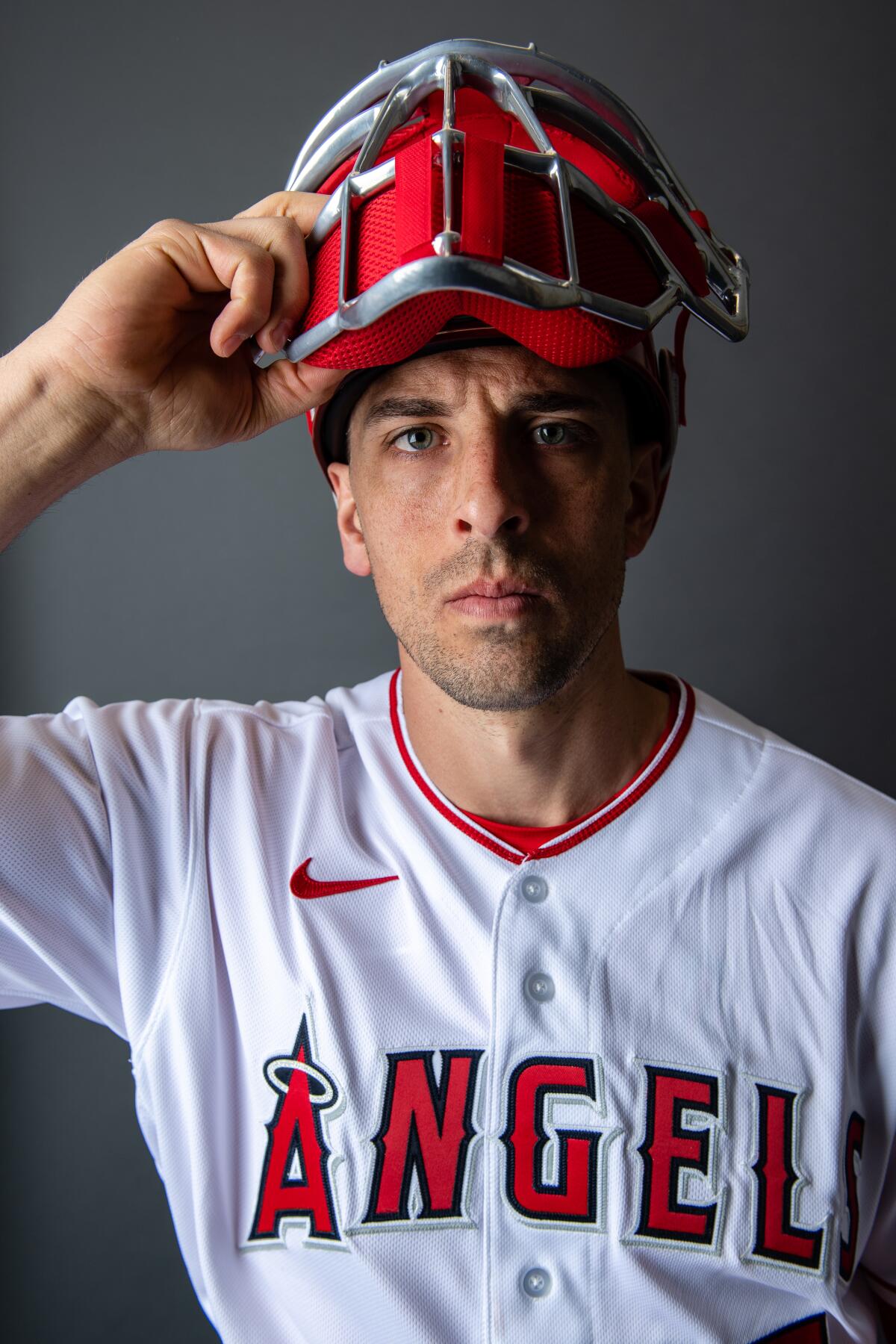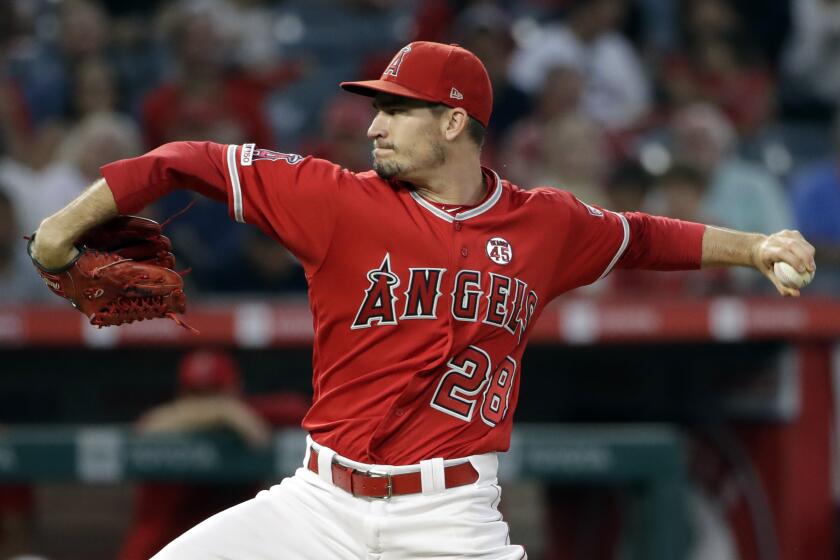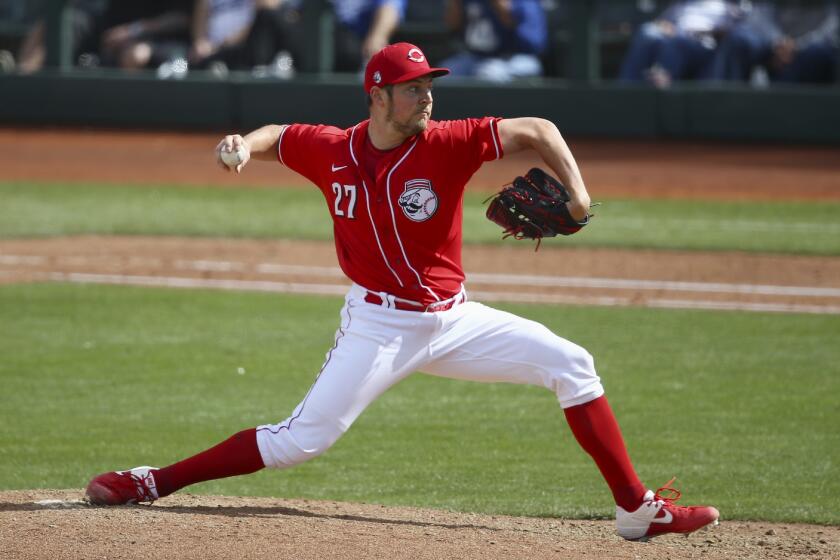New Angels catcher Jason Castro survived Astros’ tanking, missed trash-can banging

- Share via
GOODYEAR, Ariz. — Jason Castro played for the Houston Astros before they were mocked and ridiculed for cheating.
Castro, the Angels’ newest catcher, played for the Astros when they were mocked and ridiculed for losing.
The Astros lost 106 or more games in three consecutive seasons. In the last two of those seasons — in 2012 to 2013, the first years under now-disgraced general manager Jeff Luhnow — Castro emerged as the Astros’ primary catcher.
“Those were the formative years of my big league career,” Castro said. “I had an opportunity to work with a lot of young pitchers and tried to take advantage of that.”
Luhnow had an opportunity to tilt his team’s priorities. He played to lose, stripping the Astros of veterans in the interest of building the foundation of a winner by stocking up on high draft picks.
Manager Joe Maddon said he would announce the Angels’ opening day starter this week, with left-hander Andrew Heaney a leading candidate.
By the time the Astros emerged as the 2017 World Series champions, the strategy had a name. It was called tanking.
“They proved the model,” Castro said. “But what kind of gets lost — and what makes it tough to replicate — is they hit on their draft picks, for the most part.”
The Astros landed third baseman Alex Bregman, shortstop Carlos Correa, outfielder George Springer and World Series Game 7 starting pitcher Lance McCullers Jr. in the first round of the draft. They also whiffed on the first overall pick of the draft in 2013 (pitcher Mark Appel) and 2014 (pitcher Brady Aiken).
“I think that’s why that model can be a little unpredictable,” Castro said, “and not as easy to replicate as it may seem.”
The Astros’ championship in 2017 had been preceded by the Chicago Cubs’ championship in 2016, also via tanking, thus spawning a wave of owners eager to slash their payrolls and suck up defeats in the hope of winning a few years down the road.
Of course, only one team can have the first pick in any draft, and only one team can win the World Series in any year. Major league attendance has fallen for four consecutive years, a decline the players’ union attributes largely to owners all but announcing their intention to field noncompetitive teams. Also, the last two World Series winners — the Boston Red Sox in 2018, the Washington Nationals in 2019 — did not tank.
Relief pitcher Ken Giles says he knew nothing about the sign-stealing scheme that took place during at least part of his stint with the Houston Astros.
The Astros did, proudly.
“It’s one strategy to use,” Castro said. “It’s not necessarily the easiest to replicate or most effective. It worked in their instance, but for the greater good and health of baseball in general, I don’t think it’s the best for everybody to try and copy.”
It is certainly not the best for players such as Castro, now a 32-year-old veteran. Even noncontending teams used to prize veterans like him for clubhouse leadership and for a few more wins. Teams that tank prefer losing 100 games to losing 90, since neither season is a contending one.
“It’s been a polarizing thing throughout baseball,” he said. “I think the players have been affected by it in different ways than maybe, at the outset, we didn’t realize would be coming down the pipeline.”
In Anaheim, Castro can provide his trademark pitch framing skills while adding some pop to a position that has long been an offensive wasteland. The Angels’ catchers have not posted a .700 OPS since 2014, the last time the team made the playoffs.
Castro has a career OPS of .703. He batted .232 with 13 home runs for the Minnesota Twins last season, with a .767 OPS.
Cincinnati Reds pitcher Trevor Bauer purposely signaled what he was going to throw during an at-bat against Dodgers outfielder Matt Beaty.
In 2016, his last year with the Astros, he hit .210, with a .684 OPS. If the Astros had started banging on trash cans a year sooner, Castro might have had better statistics to take into free agency. If they had kept Castro a year longer, he would have had a World Series ring.
“I had friends that were like, when they did win back in ’17, ‘That sucks that you weren’t there for that, that you weren’t a part of that winning team.’
“Now they’re like, ‘Maybe it wasn’t such a bad thing you weren’t there for that.’ ”
More to Read
Go beyond the scoreboard
Get the latest on L.A.'s teams in the daily Sports Report newsletter.
You may occasionally receive promotional content from the Los Angeles Times.









